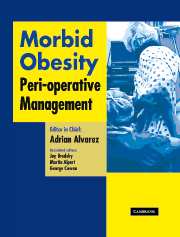Book contents
- Frontmatter
- Contents
- Contributors
- Foreword
- Preface
- Acknowledgments
- Dedication
- Section 1 General aspects
- Section 2 Pathophysiology
- Section 3 Pre-operative management
- Section 4 Peri-operative management of co-morbidities
- Section 5 Pharmacology
- Section 6 Monitoring
- Section 7 Intra-operative management
- Section 8 Post-operative care
- Section 9 Conclusions
- Afterword
- Index
Foreword
Published online by Cambridge University Press: 17 August 2009
- Frontmatter
- Contents
- Contributors
- Foreword
- Preface
- Acknowledgments
- Dedication
- Section 1 General aspects
- Section 2 Pathophysiology
- Section 3 Pre-operative management
- Section 4 Peri-operative management of co-morbidities
- Section 5 Pharmacology
- Section 6 Monitoring
- Section 7 Intra-operative management
- Section 8 Post-operative care
- Section 9 Conclusions
- Afterword
- Index
Summary
In the last 25 years, overweight (body mass index, BMI > 25 kg/m2) and obesity (BMI >30 kg/m2) have developed into a global epidemic. This increase in obesity cannot be attributed to genetics alone; rather, complex fast-food and nutritional causes, lifestyle changes and physical inactivity have become important factors.
The severe form of obesity, called morbid obesity, occurs in patients with BMI > 40 (or >35kg/m2 with severe co-morbidities) and is associated with serious, debilitating and progressive sequelae.
Morbid obesity and super-obesity (BMI > 50kg/m2) have significant co-morbidities — type 2 diabetes, cardiovascular disease, hypertension, deep vein thromboses and pulmonary embolism, debilitating arthritis of weightbearing joints and low back, an increased incidence of certain cancers, alveolar hypoventilation (Pickwickian) and/or obstructive sleep apnea, foul intertrigos under skin folds, abdominal and hiatal hernias, gastroesophageal reflux disease, stasis leg ulcers, accident proneness, plethora and diaphoresis, immobility, gallbladder disease, amenorrhea, increased incidence of Caesarian section, urinary stress incontinence in females, psychosocial and economic problems, etc.
These patients require medical assistance by multiple allied health fields — internal medicine, endocrinology, pulmonology, psychiatry and psychology, eating disorder specialists, nutritionists and dietitians, specialized nursing care, plastic surgery, intensive care specialists, social workers and governmental assistance for disability, among others.
- Type
- Chapter
- Information
- Morbid ObesityPeri-Operative Management, pp. xi - xiiPublisher: Cambridge University PressPrint publication year: 2004

